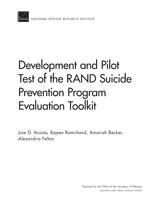| 来源类型 | Research Reports
|
| 规范类型 | 报告
|
| 来源ID | RR-283-OSD
|
| Development and Pilot Test of the RAND Suicide Prevention Program Evaluation Toolkit |
| Joie D. Acosta; Rajeev Ramchand; Amariah Becker; Alexandria Felton
|
| 发表日期 | 2013
|
| 出版年 | 2013
|
| 页码 | 51
|
| 语种 | 英语
|
| 结论 |
There Is a Need for a Comprehensive Toolkit to Help the U.S. Department of Defense Evaluate Its Suicide Prevention Efforts- The U.S. Department of Defense (DoD) has been actively engaged in preventing suicides among service members, but evaluations of new and existing programs are critical for assessing the impact of DoD investments in suicide prevention.
- The DoD Task Force on the Prevention of Suicide Among Members of the Armed Forces and a RAND project on preventing suicide in the U.S. military both recommended that all DoD suicide prevention initiatives include an evaluation component.
- Such evaluations can be used to determine whether programs achieve their intended goals (e.g., raising awareness and promoting self-care among service members) and can be used as the basis for decisions about whether to sustain, scale up, or discontinue efforts.
The RAND Suicide Prevention Program Evaluation Toolkit Incorporates the Latest Scientific Research and Feedback from Program Staff Across DoD- The toolkit's development included a rigorous examination of the program evaluation literature, which offers guidance and measures for a vast range of program types, resource levels, and expertise.
- It is important that the toolkit remain user-friendly while guiding program staff through the evaluation process. Pilot testing the toolkit with program directors and coordinators helped ensure that users would be comfortable using the tools and that the instructions were clear and applicable to the goals of their evaluations.
|
| 摘要 |
- Although the toolkit is a comprehensive, user-friendly resource for program evaluation and draws on the latest scientific literature, program needs will continue to evolve. The Defense Centers of Excellence for Psychological Health and Traumatic Brain Injury (DCoE) should develop a plan to regularly review the toolkit so that it can be updated and optimized on a regular basis.
- During pilot testing, users expressed an interest in an interactive, online version of the toolkit resources to animate some of the data analysis features of the toolkit and link toolkit worksheets together so they "fill forward," streamlining completion of the toolkit steps. DCoE should consider offering the toolkit in such a format, which would also make it easier to update.
- DCoE should continue partnering with the Suicide Prevention and Risk Reduction Committee and the Defense Suicide Prevention Office, which includes suicide prevention program managers from each military service, to identify dissemination strategies and ensure that the toolkit is widely available across the U.S. Department of Defense. It would also be helpful to provide programs with training and technical support to ensure that they can make the best use of the process and materials as they conduct their evaluations.
|
| 主题 | Health Care Program Evaluation
; Mental Health Treatment
; Suicide
; Veterans Health Care
|
| URL | https://www.rand.org/pubs/research_reports/RR283.html
|
| 来源智库 | RAND Corporation (United States)
|
| 资源类型 | 智库出版物
|
| 条目标识符 | http://119.78.100.153/handle/2XGU8XDN/107529
|
推荐引用方式
GB/T 7714 |
Joie D. Acosta,Rajeev Ramchand,Amariah Becker,et al. Development and Pilot Test of the RAND Suicide Prevention Program Evaluation Toolkit. 2013.
|
|
文件名:
|
1393276059752.gif
|
|
格式:
|
GIF
|

|
文件名:
|
RAND_RR283.pdf
|
|
格式:
|
Adobe PDF
|
除非特别说明,本系统中所有内容都受版权保护,并保留所有权利。